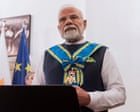
In a week marked by significant international and local developments, the world is witnessing a blend of cultural, diplomatic, and social advancements. From a historic diplomatic visit in the Caribbean to musical endeavors connecting cultures, and from healthcare advocacy in Australia to essential child safety legislations, these narratives weave a rich tapestry of global events.
Prime Minister Narendra Modi of India embarks on a momentous journey to Trinidad and Tobago, a visit that garners varied reactions. For the first time, a sitting Indian prime minister is setting foot in the Caribbean nation, welcomed with the nation’s highest honor. Invited by Kamla Persad-Bissessar, the newly appointed Prime Minister of Trinidad and Tobago, Modi’s visit underscores longstanding diplomatic ties. However, it’s not just ceremonial gatherings and honors. The local Indo-Trinidadian Hindu community embraces the visit warmly, though it faces detractors from the country’s larger Muslim community over Modi’s human rights records. As the visit unfolds, it highlights the shared history and cultural ties between India and the diaspora while encouraging dialogue on concerns raised by various groups in Trinidad.
In a symphony of cultural preservation, musicians from Gaza find a stage at the Sydney Opera House, in a performance infused with the spirit of the Levant. Curator Ayşe Goknur Shanal orchestrates a poignant show amidst ongoing conflicts, highlighting the soulful resilience of a heritage under threat. This artistic endeavor emerges as a refuge for culture, aimed at protecting and preserving the Levantine legacy. Attendees are introduced to the rhythms and sounds of the Levant, expressed through dance and music. Notably, the dance ‘dabke’ embodies unity, becoming a symbol of cultural solidarity and hope amidst adversities.
Healthcare in Australia sees a responsive halt to planned staffing cuts at Royal Prince Alfred Hospital’s women and babies unit. Following a protest by midwives and clinical staff, management swiftly paused adjustments that were perceived as potential risks to patient care. The protest underlined the crucial role of adequate staffing in delivering safe and effective healthcare services, particularly in maternal and newborn care. This decision reflects an adaptive approach to ensuring that patient welfare remains paramount, while opening dialogues towards a fairer resolution concerning staffing and resource allocation.
Turning to childcare, the Australian federal government is taking definitive steps to fast-track legislation intended to bolster safety standards across the sector. In light of distressing allegations of misconduct at a Melbourne childcare facility, the government plans to introduce enhanced oversight measures. A key feature is strengthening the regulatory framework with provisions that could cut funding to non-compliant operators. Concurrently, Victoria appoints experts Jay Weatherill and Pamela White to spearhead a swift review of the sector’s safety protocols. These actions reveal a commitment to safeguarding children and assuring parents of secure and nurturing childcare environments.
Amidst ongoing societal introspection, conversations around child safety continue to resonate strongly. As concerns arise regarding abuse in trusted spaces, guidance emerges on discussing body safety with children. Empowering children with the knowledge of safe and unsafe touches, and fostering an environment of open communication with trusted adults is paramount. This dialogue emphasizes preventive education as a cornerstone of child well-being.
The above narratives speak volumes about the collective human experience – where diplomacy meets the arts, healthcare meets advocacy, and societal values are steadfastly preserved. Through mindful and concerted efforts, these stories invite reflection on the global journey towards cultural understanding, healthcare resilience, and child safety, resonating a hopeful note in the symphony of life.
Source: {link}
